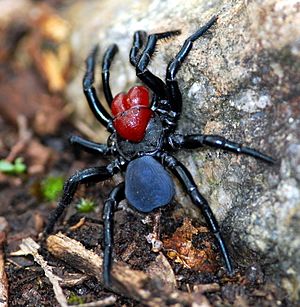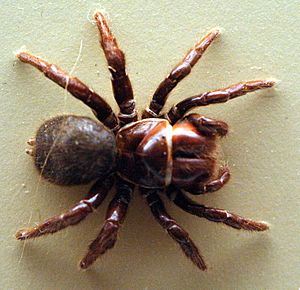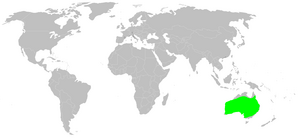Red-headed mouse spider facts for kids
Quick facts for kids Red-headed mouse spider |
|
|---|---|
 |
|
| Male | |
 |
|
| Female | |
| Scientific classification |
|
| Kingdom: | Animalia |
| Phylum: | Arthropoda |
| Subphylum: | Chelicerata |
| Class: | Arachnida |
| Order: | Araneae |
| Infraorder: | Mygalomorphae |
| Family: | Actinopodidae |
| Genus: | Missulena |
| Species: |
M. occatoria
|
| Binomial name | |
| Missulena occatoria Walckenaer, 1805
|
|
 |
|
| Script error: The function "autoWithCaption" does not exist. | |
Script error: No such module "Check for conflicting parameters".
The red-headed mouse spider (scientific name: Missulena occatoria) is a fascinating spider found in Southern Australia. You can find it in many places, from open forests to dry desert areas. It is the biggest and most widespread type of mouse spider. Female red-headed mouse spiders can grow up to 24 millimeters long, while males are smaller, reaching about 12 millimeters.
These spiders are special because their babies, called spiderlings, can travel by wind. This is called "ballooning." They let out silk threads that catch the wind, carrying them to new places. This way of traveling helps them spread out across many different areas.
Contents
About the Red-headed Mouse Spider
What Do They Look Like?
Female red-headed mouse spiders are mostly black, sometimes with a hint of red. The males are much more colorful! They have a bright red head and jaws. Their body, called the abdomen, is a shiny blue-black color, like gunmetal.
Where Do They Live?
Red-headed mouse spiders dig burrows deep in the ground. These burrows can be up to 55 centimeters deep. They build two special trapdoors at the entrance to their homes. These trapdoors help keep them safe and hidden.
How Do They Travel?
Most spiders that travel by wind are from a group called araneomorphs. But the red-headed mouse spider is a mygalomorph spider. Most mygalomorphs usually just walk to move around. So, the red-headed mouse spider's ability to "balloon" is quite unique for its group! This helps them find new homes and food sources.
Are They Dangerous?
The venom of the red-headed mouse spider can be very strong. However, it's rare for someone to get seriously sick from a bite. Most bites only cause mild effects, like a little pain or swelling. If someone is bitten, doctors can use antivenom that is made for Australian funnel-web spiders. This antivenom has been helpful in treating bites from the red-headed mouse spider.
Discovery of the Spider
The red-headed mouse spider was first described in 1805 by a scientist named Charles Athanase Walckenaer. Scientists have sometimes confused this spider with another similar species, Missulena insignis. However, they are now generally considered to be different species.
 | Laphonza Butler |
 | Daisy Bates |
 | Elizabeth Piper Ensley |

